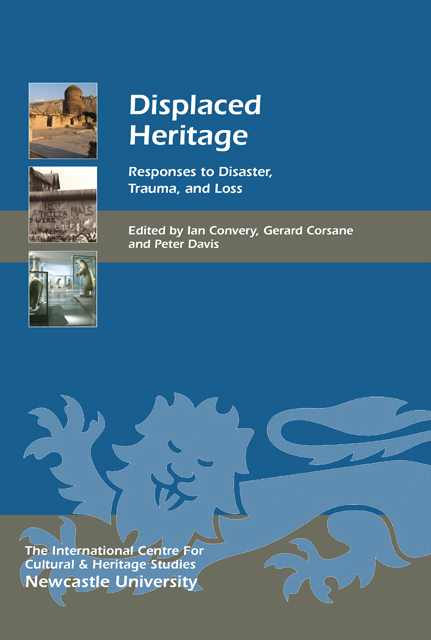Book contents
- Frontmatter
- Contents
- List of Illustrations
- Acknowledgments
- List of Abbreviations
- Preface
- Introduction
- Displaced Heritage: Histories and Tourism
- Displaced Heritage: Trauma, Confinement and Loss
- Displaced Heritage: Lived Realities, Local Experiences
- Displaced Natural Heritage
- Endpiece
- List of Contributors
- Index
- Heritage Matters
12 - Restoring Gorongosa: Some Personal Refl ections
Published online by Cambridge University Press: 24 February 2023
- Frontmatter
- Contents
- List of Illustrations
- Acknowledgments
- List of Abbreviations
- Preface
- Introduction
- Displaced Heritage: Histories and Tourism
- Displaced Heritage: Trauma, Confinement and Loss
- Displaced Heritage: Lived Realities, Local Experiences
- Displaced Natural Heritage
- Endpiece
- List of Contributors
- Index
- Heritage Matters
Summary
Introduction
Mozambique has a rich, diverse natural heritage. Nowhere is this better represented than Gorongosa National Park (GNP), for decades a symbol of Mozambique to the outside world (see Fig 12.1). Situated at almost the geographical centre of Mozambique, GNP was once one of southern Africa’s most richly endowed protected areas. At independence Mozambique had only three terrestrial national parks; GNP was the largest, most well-known and easiest to access. In its heyday GNP was the playground of the rich and famous; visitors included American astronauts and Hollywood stars. The Apollo 16 astronaut Charles Duke, visiting the park in 1971, is reported to have remarked that visiting GNP was as ‘thrilling as landing on the moon’ (Hanes 2007, 87). However, the park became synonymous with a long and bloody civil war, and its destruction mirrored that of the country as a whole.
GNP is now returning to its former glory after decades of war and under-investment, thanks in part to an innovative public–private partnership between the Government of Mozambique and the Carr Foundation. Much has been written about the success of this project, so in this chapter we want to tell the story of an earlier, less celebrated (but no less important) initiative to restore GNP. In doing so we offer personal reflections on our time working in GNP as part of the 1996–1999 IUCN/ETC African Development Bank-funded project to restore the park (hereafter referred to as the ETC project). The project was started only a few years after the 1992 Rome Peace Accord, at a time when working in Mozambique was both challenging and potentially dangerous.
In a 2009 National Geographic film, Carlos Lopes Pereira (then Head Ranger at GNP) states that ‘if Mozambique loses GNP, it loses its soul’ (Nat Geo WILD 2010). We would agree with this sentiment; it is a breathtakingly beautiful landscape. Our account is based on memory and perception; these are personal experiences, and while we make reference to literature, in the tradition of storytelling and following Roland Barthes’ suggestion that narrative texts are not one thing but a weaving together of different strands, we can only hope to tell one of many truths about restoring GNP and the cultural importance of lions (Panthera leo) to both the park and the surrounding community. In doing so we also offer some thoughts on the management of natural heritage, both during and after armed conflict.
- Type
- Chapter
- Information
- Displaced HeritageResponses to Disaster, Trauma, and Loss, pp. 129 - 142Publisher: Boydell & BrewerPrint publication year: 2014

